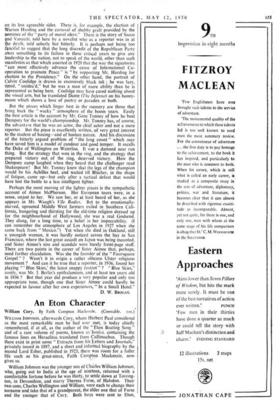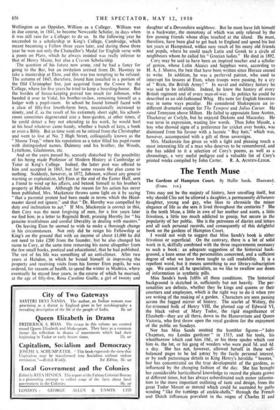An Eton Character
William Cory. By Faith Compton Mackenzie. (Constable. 2
WILLIAM JOHNSON, afterwards Cory, whom Herbert Paul considered as the most remarkable man he had ever met, is today chiefly remembered, if at all, as the author of the " Eton Boating Song " and of a rare volume of poems, known as'Ionica, containing the famous lines on Heraclitus translated from Callimachus. Though there exist in print some " Extracts from his Letters and Journals," privately issued in 1897, and a short and infortnal biography by the second Lord Esher, published in 1923, there was room for a fuller life such as his great-niece, Faith Compton Mackenzie, now gives us. William Johnson was the younger son of Charles William Johnson, who, going out to India at the age of nineteen, returned with a comfortable fortune before he was thirty, to settle down at Torring- ton, in Devonshire, and marry Theresa Furse, of Halsdon. Their two sons, Charles Wellington and William, were each to change their surname and take that of a grandparent, the .elder one that of Furse and the younger that of Cory. Both boys were sent to Eton, Wellington as an Oppidan, William as a Colleger.. William was in due course, in 1841, to become Newcastle Scholar, in days when it was still rare for a Colleger to do so. In the following year he succeeded to a scholarship at King's College, Cambridge, which meant becoming a Fellow three years later, and during those three year he won not only the Chancellor's Medal for English verse with a; poem on Plato, which he always insisted was really inferior to that of Henry Maine, but also a Craven Scholarship.
The question of his future now arose, and he had a fancy for going to the Bar, but an invitation arrived from Dr. Hawtrey to take a mastership at Eton, and this was too tempting to be refused. The autumn of 1845, therefore, found him installed in a portion of the Old Christopher Inn, just acquired from the Crown by the 'College, where for five years he tried to keep a boarding-house. But the burden of house-keeping proved too much for Johnson, who handed it over to Vidal, his brother-in-law, remaining himself as a lodger with a pupil-room. In school he found himself faced with a class of fifty-five fourth-form boys, occasionally increased to ninety, and if, as the result of his extremely short sight, his school- room sometimes degenerated into a bear-garden, at other times, if he could detect a boy not attending to his work, he would hurl at his head whatever came handy, whether a bunch of keys, a book or even a Bible. But as time went on he retired from the Christopher and went to live at No.-2 High Street, colloquially known as the "Mouse Trap," where his reputation as a tutor filled his pupil-room with distinguished names, Dalmeny and his brother, the Woods, Lytteltons, Gladstones, etc.
And so the years passed by, scarcely disturbed by the possibility of his being made Professor of Modern History at Cambridge or Tutor at King's College. Indeed, the latter post was offered to him and accepted in 1865, but for some reason the plan came to nothing. Suddenly, however, in 1872, Johnson, without any general warning or explanation, left Eton at the end of the Easter Half, sent a friend to wind up his affairs, and betook himself to his brother's property at Halsdon. Although the reason for his action has never been published, Mrs. Mackenzie throws some light on it by saying " that a parental protest had been made in terms which the Head- master dared not ignore," and that " Hornby was compelled by duty and inclination to act." If Mrs. _Mackenzie is correct in this, then Cory was the most forgiving of men, for a few years later we find him, in a letter to Reginald Brett, praising Hornby for " his genuine trustfulness and cordial liberality in dealing with masters."
On leaving Eton he seemed to wish to make a thorough change in his circumstances. Not only did he resign his Fellowship at King's on the ground that with an income of about £1,000 he did not need to take £200 from the founder, but he also changed his name to Cory, at the same time removing his name altogether from the few small books, poetical and educational, that he had published. The rest of his life was something of an anti-climax. After two years at Halsdon, in which he busied himself in improving the property and receiving visits from his former Eton pupils, he was ordered, for reasons of health, to spend the winter in Madeira, where eventually he stayed four years, in the course of which he married, at the age of fifty-five, Rosa Caroline Guille, a girl of twenty and daughter of a Devonshire neighbour. But he must have felt himself in a backwater, the monotony of which was only relieved by the few passing friends whose ships touched at the island. He must, therefore, have been glad to get back to England' and spend bis last ten years at Hampstead, within easy reach of his many old friends and pupils, where he could teach Latin and Greek to a circle of neighbours whom he called his " Grecian ladies." He died in 1892.
Cory may be said to have been an inspired teacher and a scholar of genius, whose Latin Alcaics and Sapphics were, according to H. A. J. Munro, the best that have been written since Horace ceased to write. In addition, he was a perfervid patriot, who used to interrupt his lessons at Eton, when troops were passing, by a cry of " Brats, the British Army! " In naval and military history he was said to be infallible. Indeed, he knew the- history of every British regiment and of every man-of-war. In politics he could be described as an old-fashioned Whig. His taste for English literature was in some ways peculiar. He considered Shakespeare an in- different dramatist except for The Tempest and Julius Caesar. He rated Tennyson above Milton. He failed to appreciate Jane Austen, Thackeray or Carlyle, but he enjoyed Dickens and Macaulay. He was terse in expression, wasting few words. Thus John Maude, a boy who showed signs of a preference for cricket over books, was dismissed from his favour with a laconic " Buy bats," which was, however, accompanied with a gift of three sovereigns.
Mrs. Mackenzie has given us with a light and pleasing touch a most interesting life of a man who deserves to be remembered, and she has added to it a selection of Cory's poems, as well as a chronology, a very useful pedigree and a valuable list of Cory's printed works compiled by John Carter. R. A. AUSTEN-LEIGH.







































 Previous page
Previous page